Global recognition for your Woolf degree
Students will earn their degrees and their academic credits in the most widely recognized accreditation system in the world, ensuring their studies receive the global recognition they deserve. To learn more about degree mobility and immigration, please see our help center.

Our degrees are aligned with global standards
Woolf degrees are structured to align with major international qualification frameworks, ensuring comparability across borders:
.svg)
European Qualifications Framework (EQF)

US degree equivalency through credential evaluation services
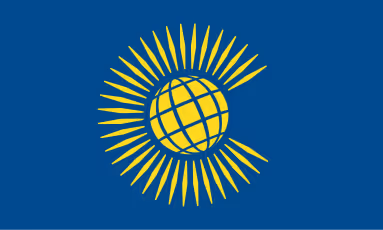
Qualification recognition across Commonwealth nations
Immigration support
Woolf degrees have supported graduates in successful immigration applications to numerous countries, including:

Student visa applications for further study
Skilled worker visa applications
Points-based immigration systems
Professional qualification recognition
View of the Roman Forum (1747) by Giovanni Paolo Panini. Oil on canvas. A Baroque panorama of the Forum from the Arch of Septimius Severus to the Temple of Saturn. Walters Art Museum, Baltimore.
Why employers worldwide love Woolf graduates
Employers worldwide recognize Woolf degrees for their academic rigor and relevance. Our graduates have secured positions with organizations across multiple sectors, benefiting from:
Straightforward credential verification process
Alignment with industry skill requirements
Recognition by multinational employers
Accepted by professional bodies

.svg)

%201.svg)

.svg)



Country recognitions
As a fully accredited Higher Education Institution, Woolf degrees are by default globally recognized. The tabs below compile country-specific information based on requests from Woolf graduates and students.


Woolf degrees may be evaluated and recognized in the United States on an equivalency basis through independent education credential assessment agencies. Woolf degrees are recognized by several established credential evaluators, which assess qualifications for purposes such as employment, further study, or professional recognition.
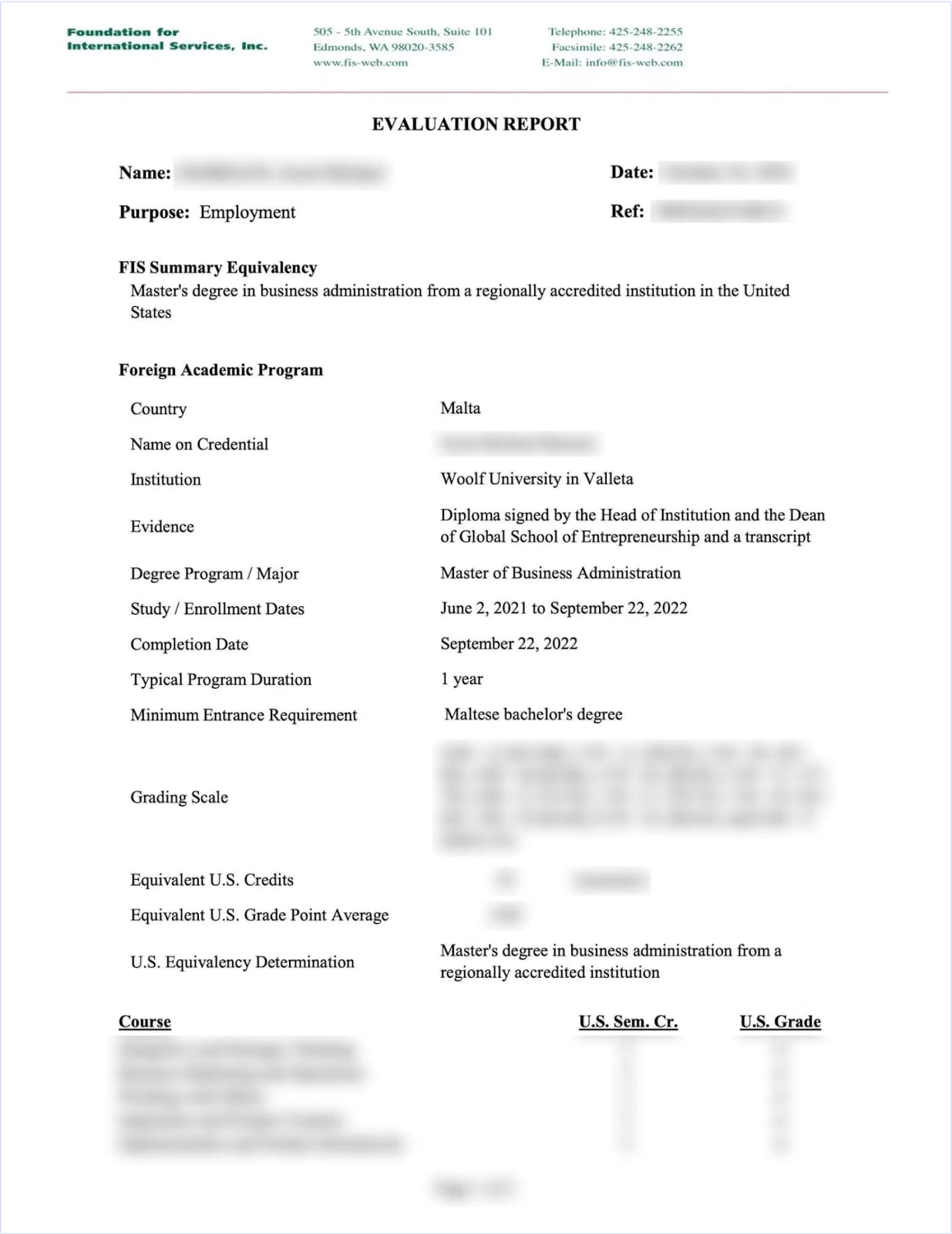


Ukraine is a signatory of the “Global Convention on the Recognition of Qualifications concerning Higher Education” (”Lisbon Convention”) and is under treaty obligation to recognize degrees issued by Woolf.


The United Kingdom is a signatory of the “Global Convention on the Recognition of Qualifications concerning Higher Education” (”Lisbon Convention”) and is under treaty obligation to recognize degrees issued by Woolf. Also, Woolf degrees are recognized in The United Kingdom on an equivalency basis through an “Education Credential Assessment”.
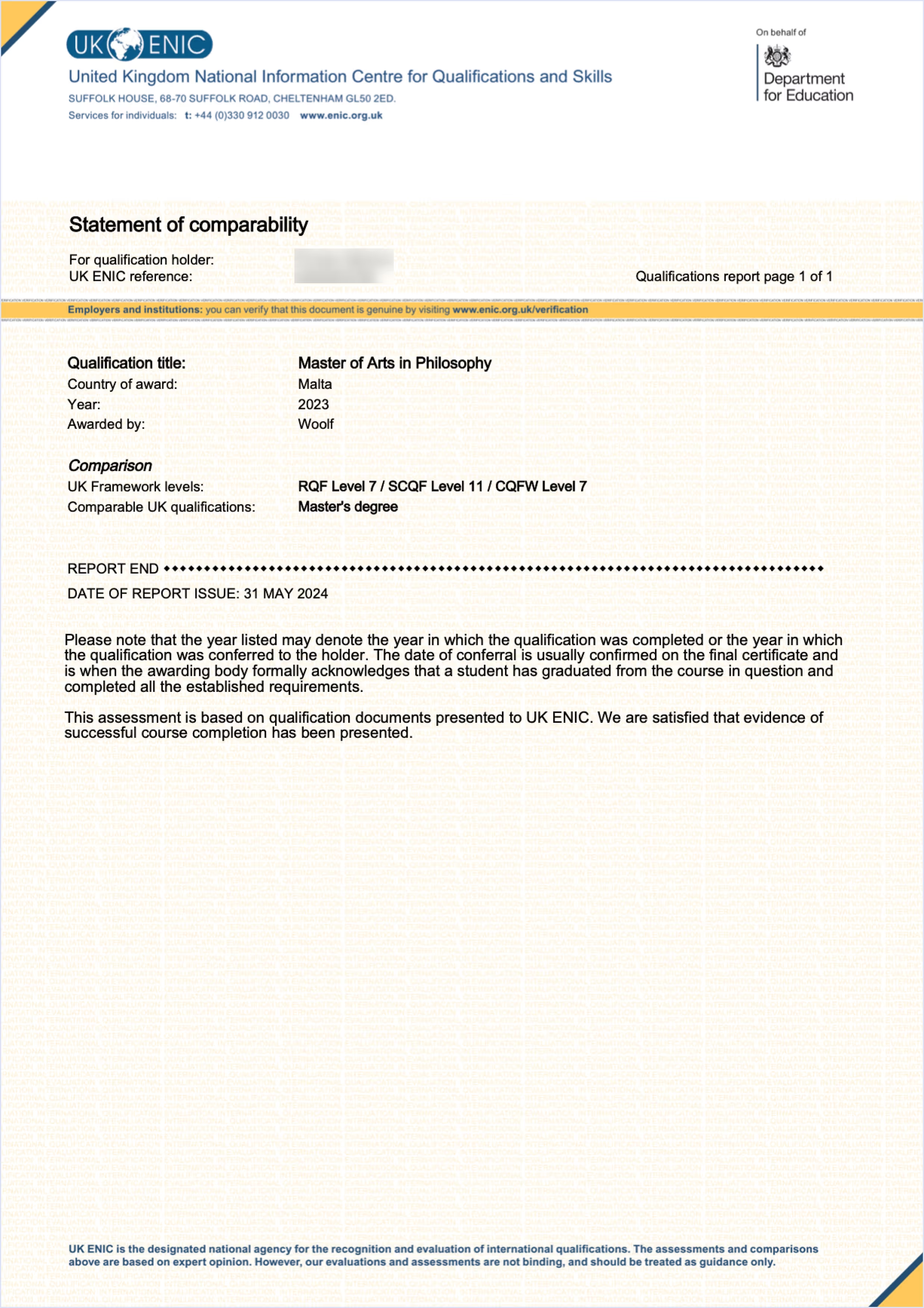


The United Arab Emirates is a signatory of the “Global Convention on the Recognition of Qualifications concerning Higher Education” (”Lisbon Convention”) and is under treaty obligation to recognize degrees issued by Woolf. Also, Woolf degrees are recognized in The United Arab Emirates on an equivalency basis through an “Education Credential Assessment”.
The UAE Ministry of Foreign Affairs (MoFA) recognizes Woolf.
_Anonymized.avif)
The UAE Ministry of Education (MoE) recognizes Woolf.
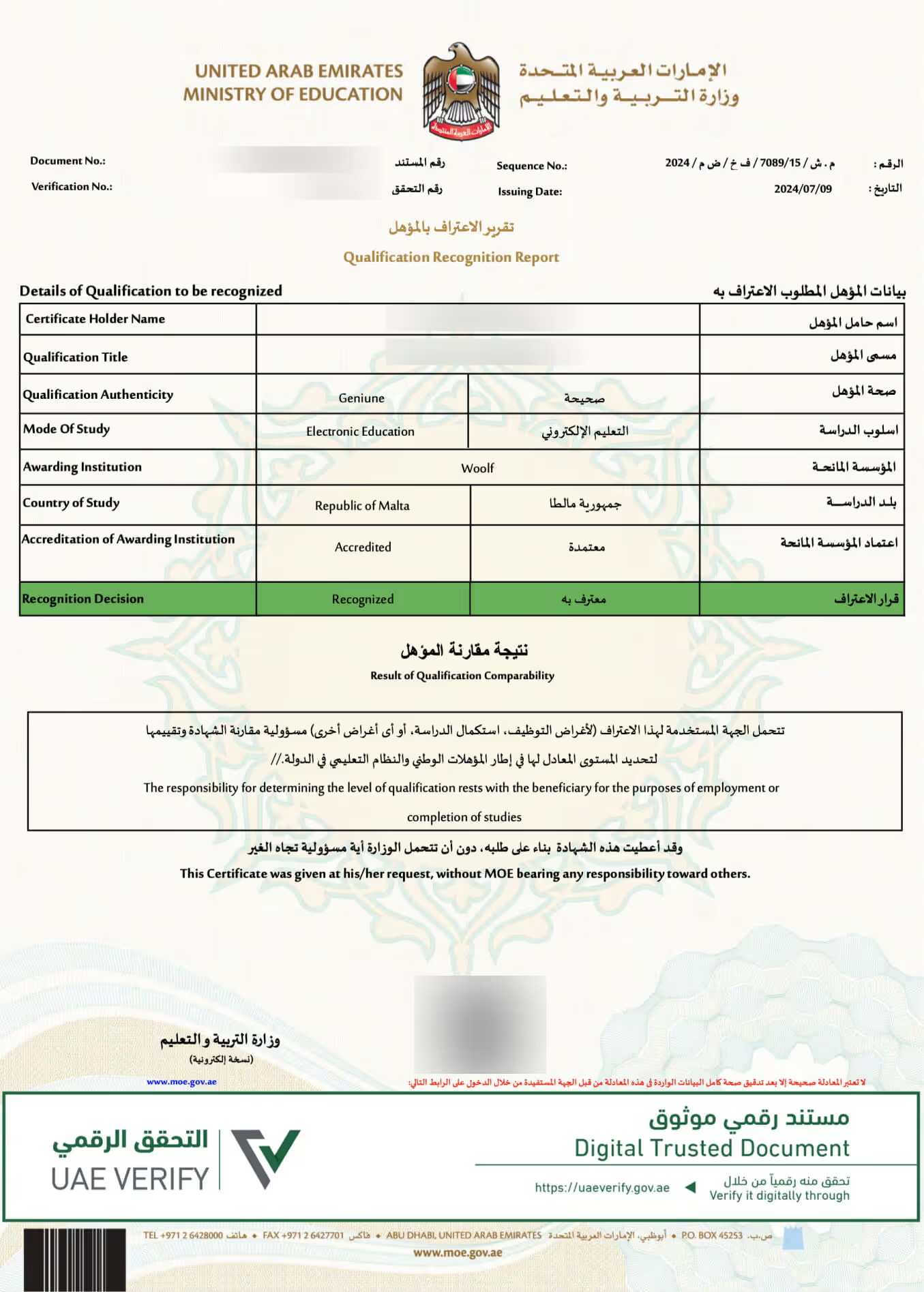


Turkey is a signatory of the “Global Convention on the Recognition of Qualifications concerning Higher Education” (”Lisbon Convention”) and is under treaty obligation to recognize degrees issued by Woolf.


Sweden is a signatory of the “Global Convention on the Recognition of Qualifications concerning Higher Education” (”Lisbon Convention”) and is under treaty obligation to recognize degrees issued by Woolf. Also, Woolf degrees are recognized in Sweden on an equivalency basis through an “Education Credential Assessment”.
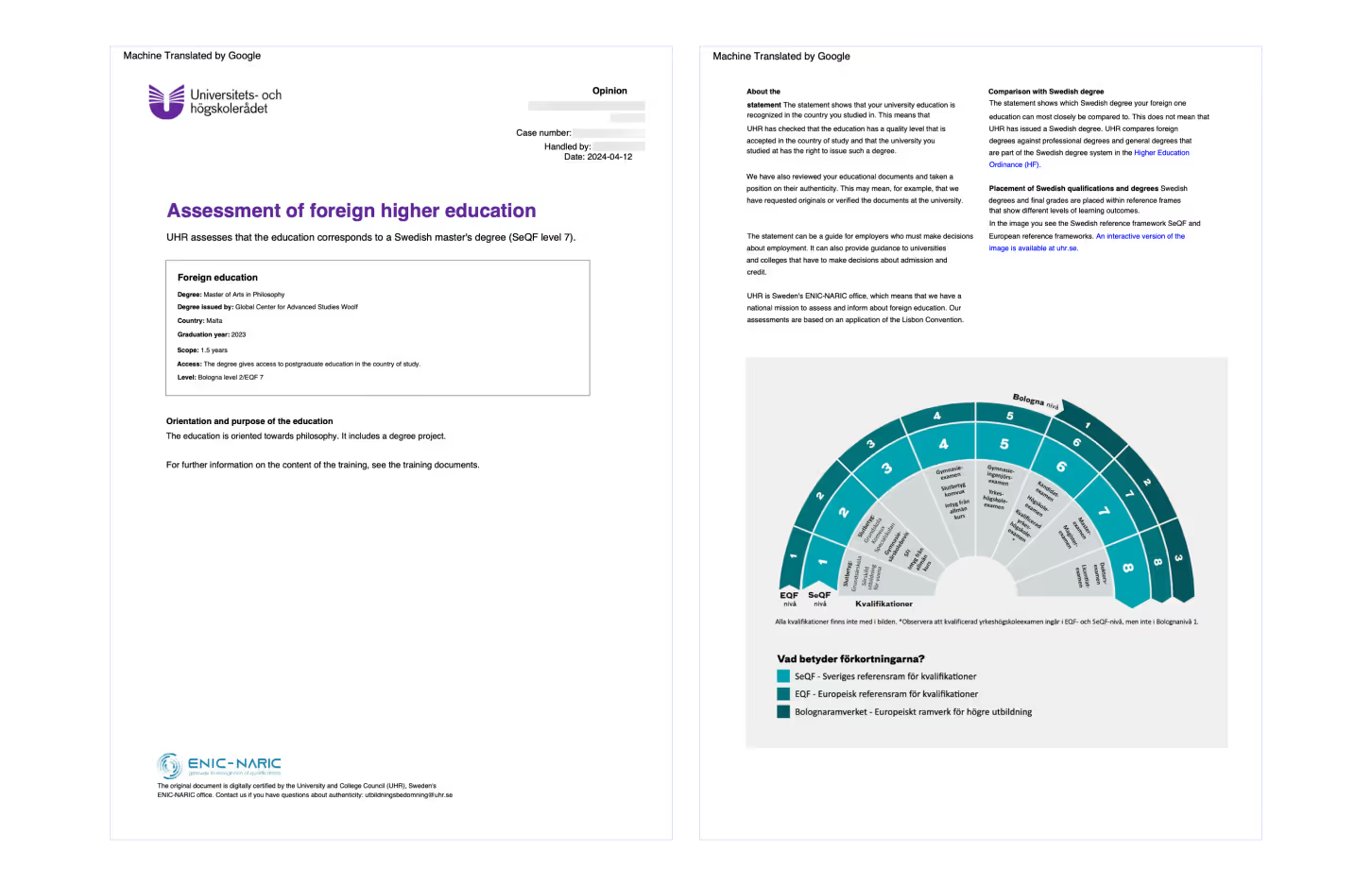


Switzerland is a signatory of the “Global Convention on the Recognition of Qualifications concerning Higher Education” (”Lisbon Convention”) and is under treaty obligation to recognize degrees issued by Woolf.


Woolf degrees are recognized in South Africa on an equivalency basis through an “Education Credential Assessment”.
The South African Qualifications Authority (SAQA) is the oversight body of the NQF and the custodian of its values and quality character.
The role of SAQA, as stipulated in the NQF Act, is to advance the objectives of the NQF, oversee the further development and implementation of the NQF, and co-ordinate the Sub-Frameworks.
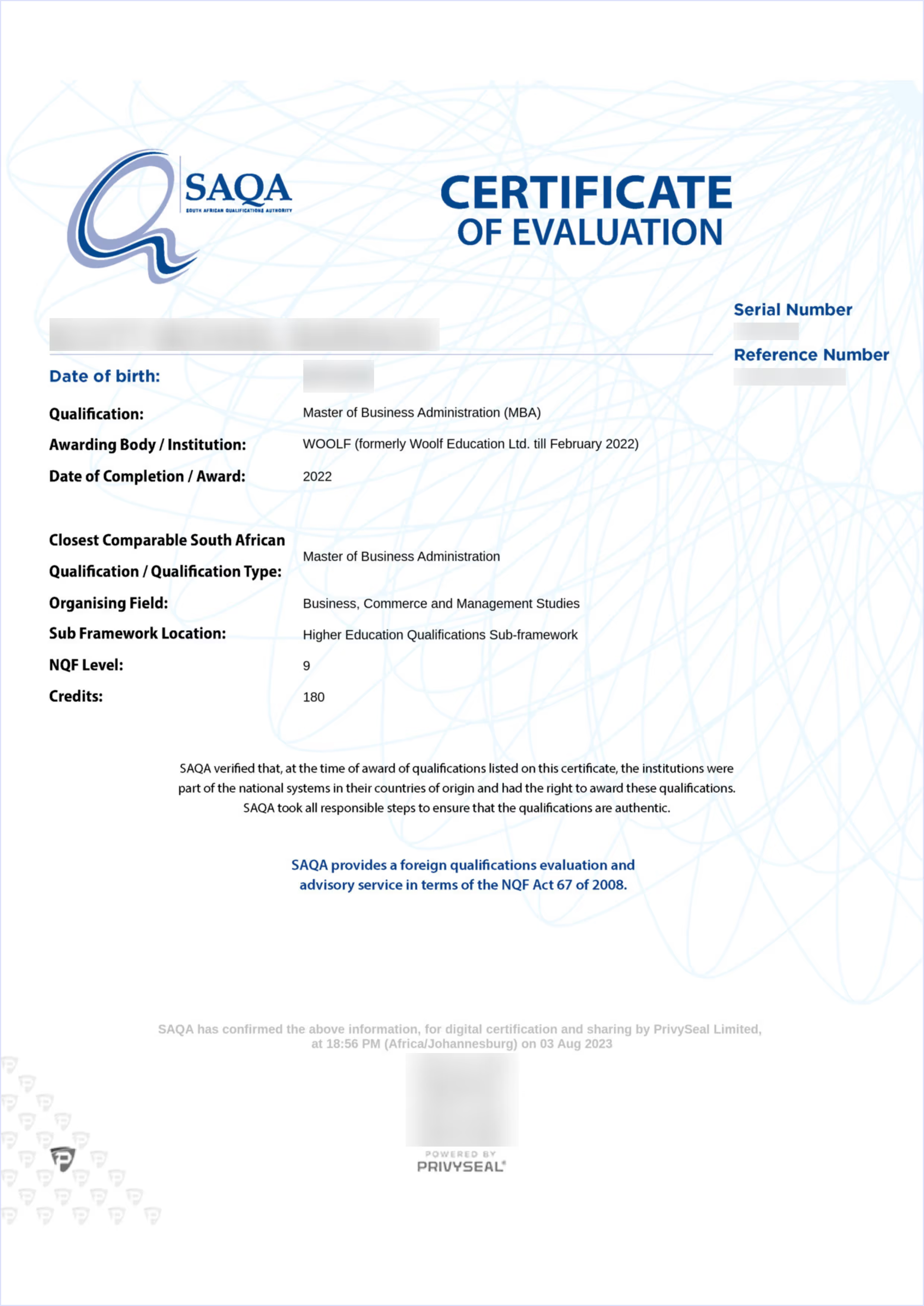


Spain is a signatory of the “Global Convention on the Recognition of Qualifications concerning Higher Education” (”Lisbon Convention”) and is under treaty obligation to recognize degrees issued by Woolf.


Slovenia is a signatory of the “Global Convention on the Recognition of Qualifications concerning Higher Education” (”Lisbon Convention”) and is under treaty obligation to recognize degrees issued by Woolf.


Slovakia is a signatory of the “Global Convention on the Recognition of Qualifications concerning Higher Education” (”Lisbon Convention”) and is under treaty obligation to recognize degrees issued by Woolf.


Serbia is a signatory of the “Global Convention on the Recognition of Qualifications concerning Higher Education” (”Lisbon Convention”) and is under treaty obligation to recognize degrees issued by Woolf.


San Marino is a signatory of the “Global Convention on the Recognition of Qualifications concerning Higher Education” (”Lisbon Convention”) and is under treaty obligation to recognize degrees issued by Woolf.


Romania is a signatory of the “Global Convention on the Recognition of Qualifications concerning Higher Education” (”Lisbon Convention”) and is under treaty obligation to recognize degrees issued by Woolf.


Russian Federation is a signatory of the “Global Convention on the Recognition of Qualifications concerning Higher Education” (”Lisbon Convention”) and is under treaty obligation to recognize degrees issued by Woolf.


Poland is a signatory of the “Global Convention on the Recognition of Qualifications concerning Higher Education” (”Lisbon Convention”) and is under treaty obligation to recognize degrees issued by Woolf. Also, Woolf degrees are recognized in Poland on an equivalency basis through an “Education Credential Assessment”.
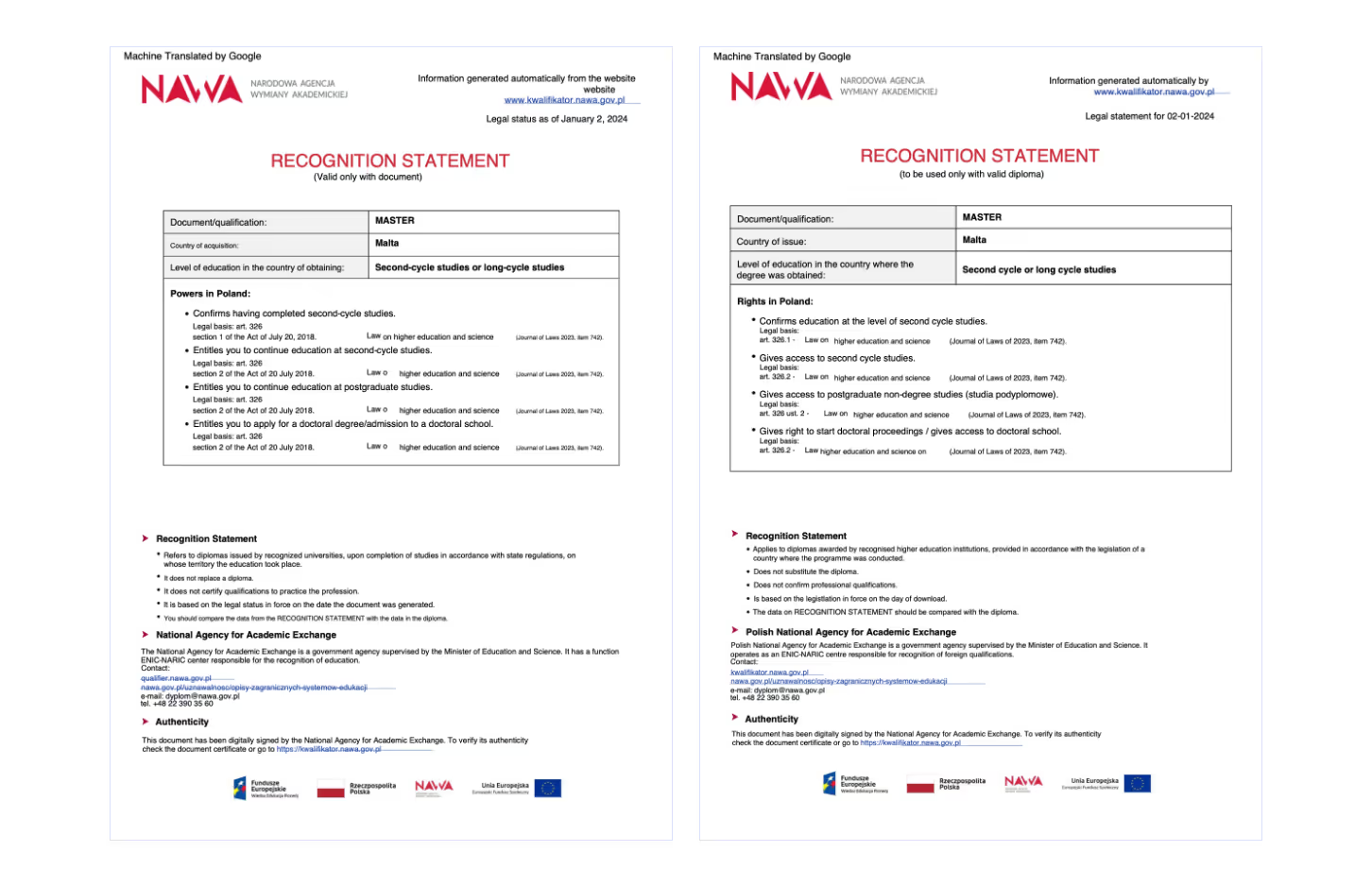


Portugal is a signatory of the “Global Convention on the Recognition of Qualifications concerning Higher Education” (”Lisbon Convention”) and is under treaty obligation to recognize degrees issued by Woolf.


Norway is a signatory of the “Global Convention on the Recognition of Qualifications concerning Higher Education” (”Lisbon Convention”) and is under treaty obligation to recognize degrees issued by Woolf. Also, Woolf degrees are recognized in Norway on an equivalency basis through an “Education Credential Assessment”.
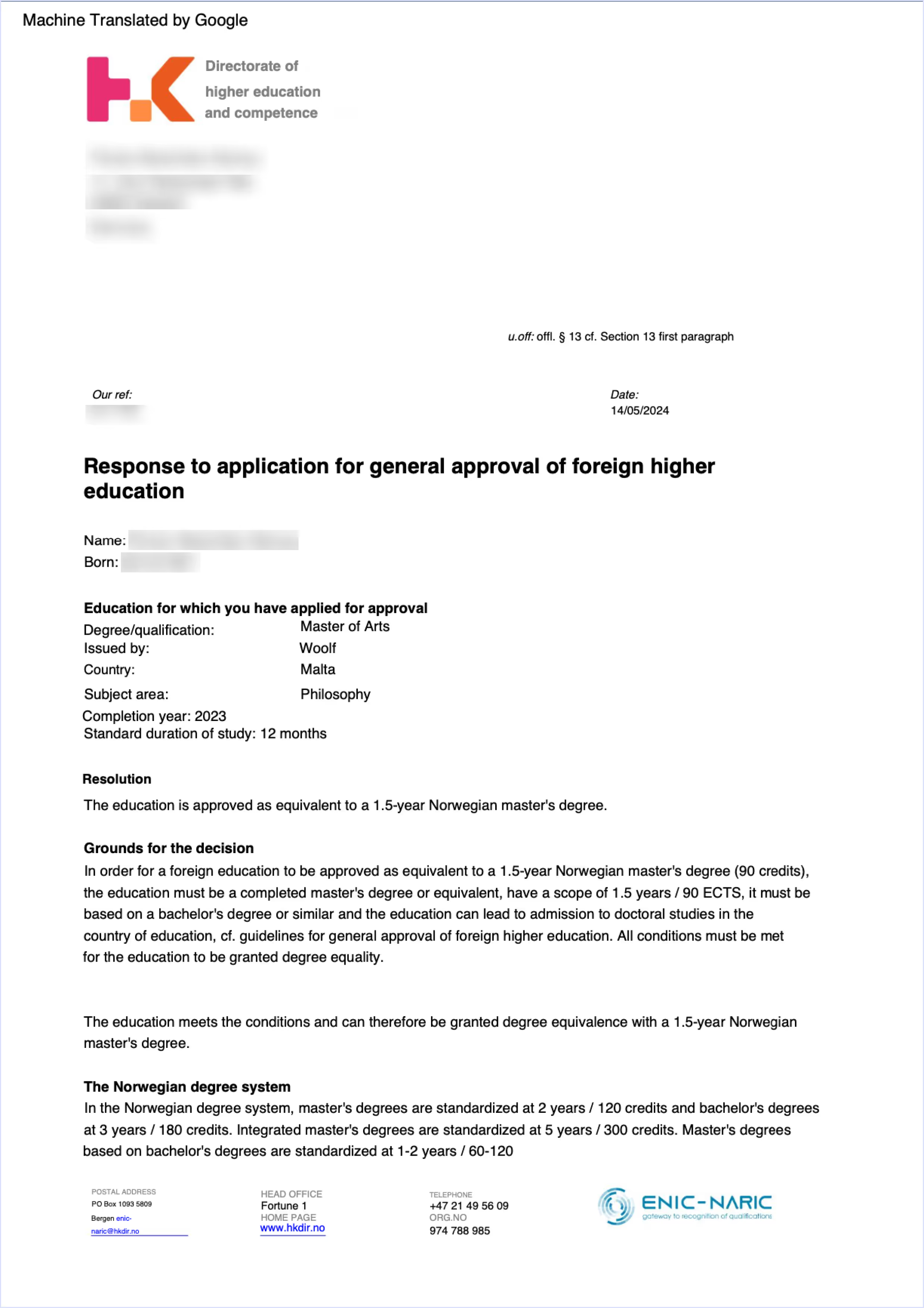


Woolf degrees are recognized in Nigeria on an equivalency basis through an “Education Credential Assessment”.
The Electronic Transcript Exchange and Certificate Verification System for Nigeria has deemed Woolf's Master of Arts in Philosophy as equivalent to a Nigerian master's degree. This confirms that the program meets Nigerian academic standards for master’s level education.
As such, graduates are well-positioned for most jobs and further education opportunities in Nigeria (excluding licensed professions such as medicine and law).
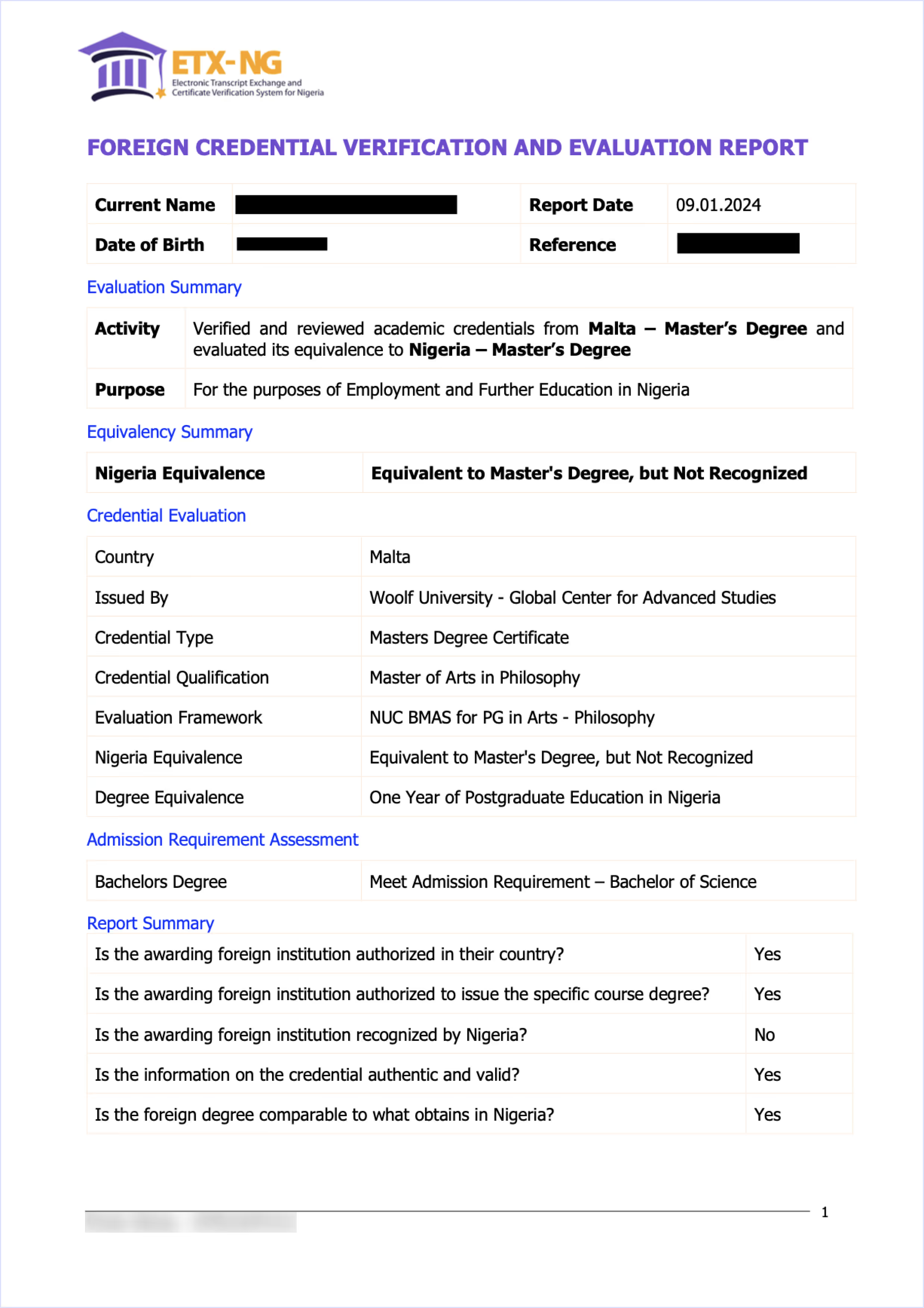


New Zealand is a signatory of the “Global Convention on the Recognition of Qualifications concerning Higher Education” (”Lisbon Convention”) and is under treaty obligation to recognize degrees issued by Woolf. Also, Woolf degrees are recognized in New Zealand on an equivalency basis through an “Education Credential Assessment”.
The ECA from New Zealand shows Woolf's Master of Business Administration as equivalent to a “Master's degree at Level 9”.
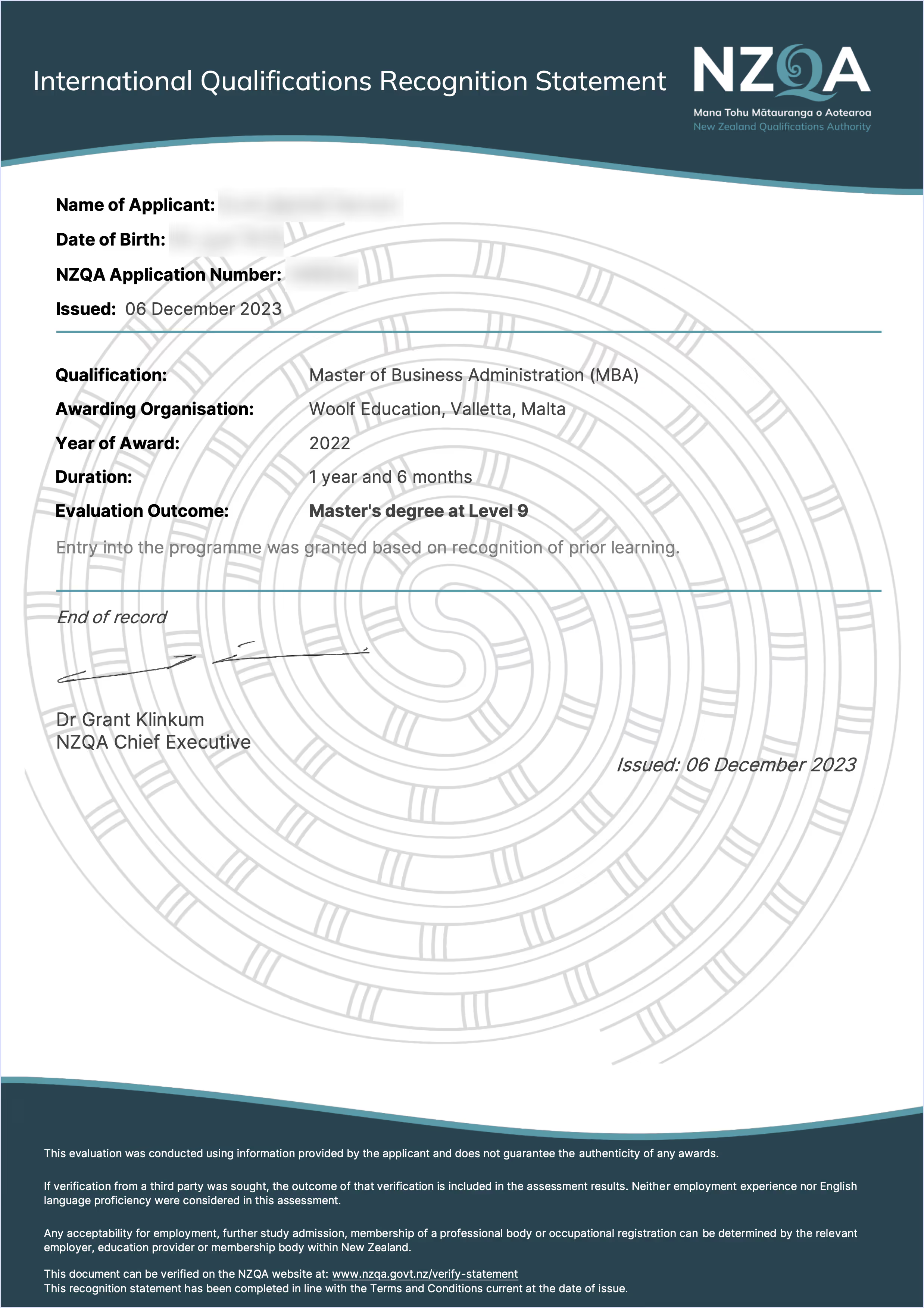


North Macedonia is a signatory of the “Global Convention on the Recognition of Qualifications concerning Higher Education” (”Lisbon Convention”) and is under treaty obligation to recognize degrees issued by Woolf.


Netherlands is a signatory of the “Global Convention on the Recognition of Qualifications concerning Higher Education” (”Lisbon Convention”) and is under treaty obligation to recognize degrees issued by Woolf. Also, Woolf degrees are recognized in Netherlands on an equivalency basis through an “Education Credential Assessment”.
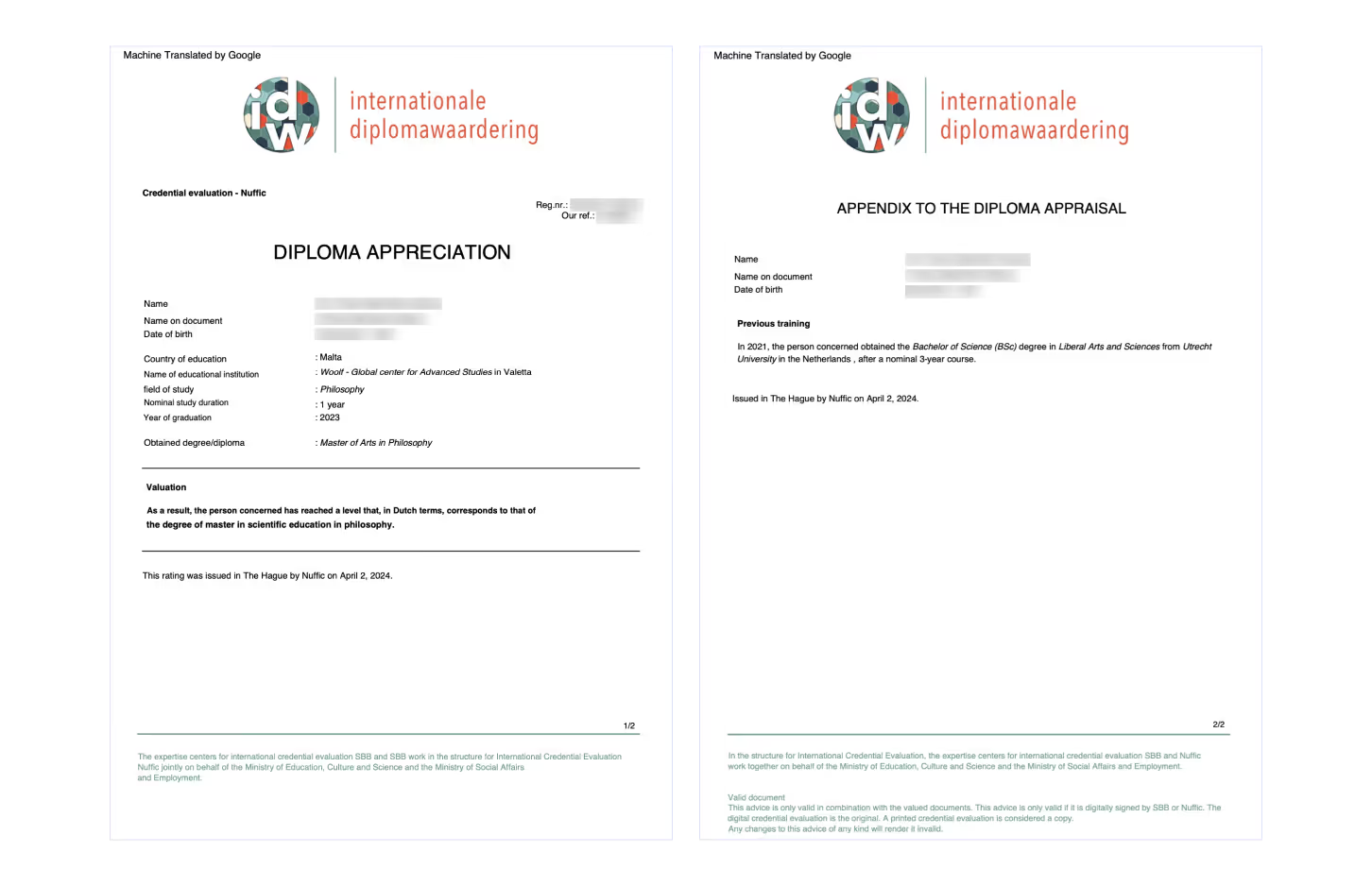


Montenegro is a signatory of the “Global Convention on the Recognition of Qualifications concerning Higher Education” (”Lisbon Convention”) and is under treaty obligation to recognize degrees issued by Woolf.


Monaco is a signatory of the “Global Convention on the Recognition of Qualifications concerning Higher Education” (”Lisbon Convention”) and is under treaty obligation to recognize degrees issued by Woolf.


Lithuania is a signatory of the “Global Convention on the Recognition of Qualifications concerning Higher Education” (”Lisbon Convention”) and is under treaty obligation to recognize degrees issued by Woolf. Also, Woolf degrees are recognized in Lithuania on an equivalency basis through an “Education Credential Assessment”.
The ECA from Lithuania recognizes Woolf's Master of Arts in Philosophy as equivalent to a Level 7 of the Lithuanian qualification structure and gives the right to apply for third cycle (PhD) programs.
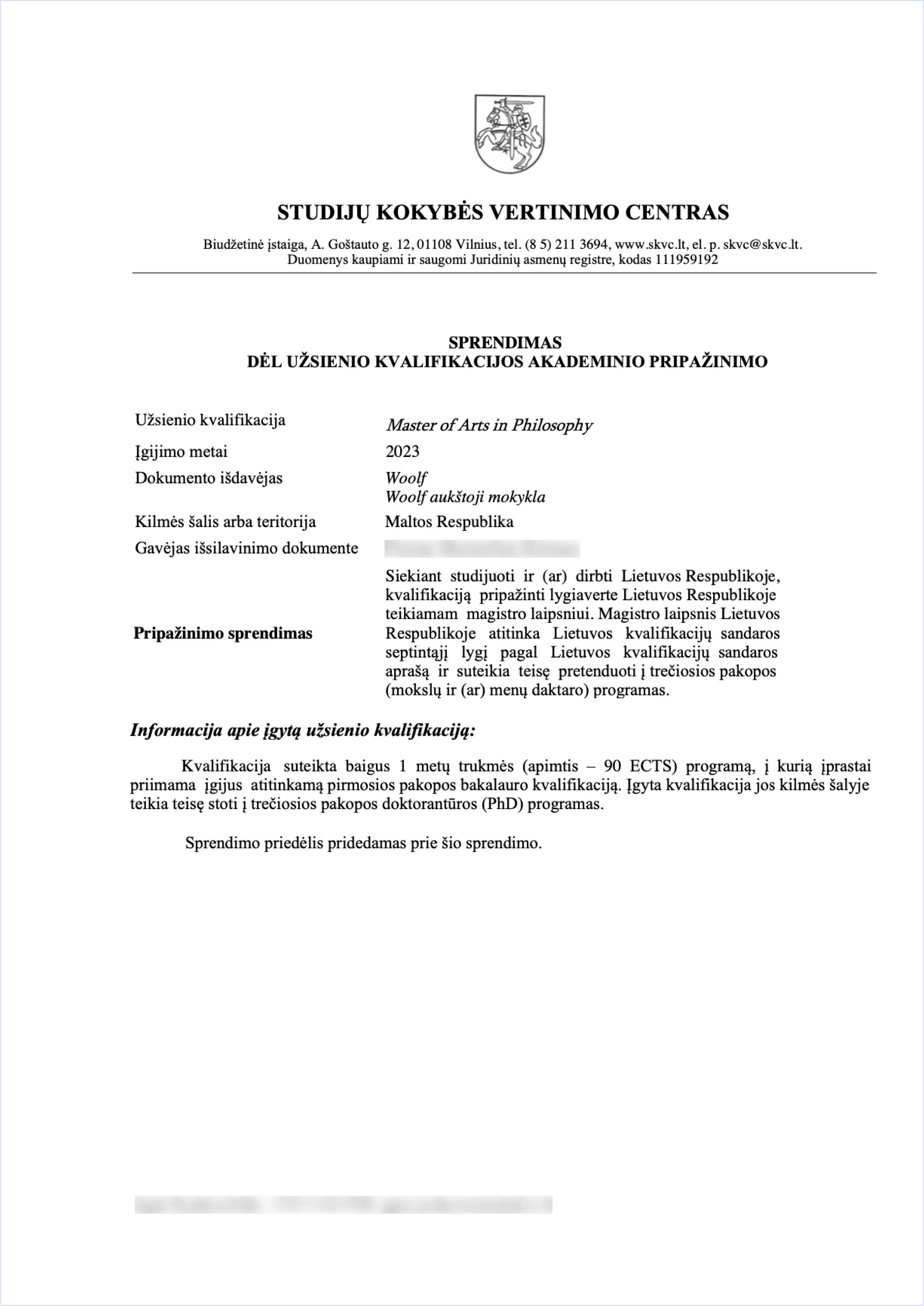


Italy is a signatory of the “Global Convention on the Recognition of Qualifications concerning Higher Education” (”Lisbon Convention”) and is under treaty obligation to recognize degrees issued by Woolf. Also, Woolf degrees are recognized in Italy on an equivalency basis through an “Education Credential Assessment”.
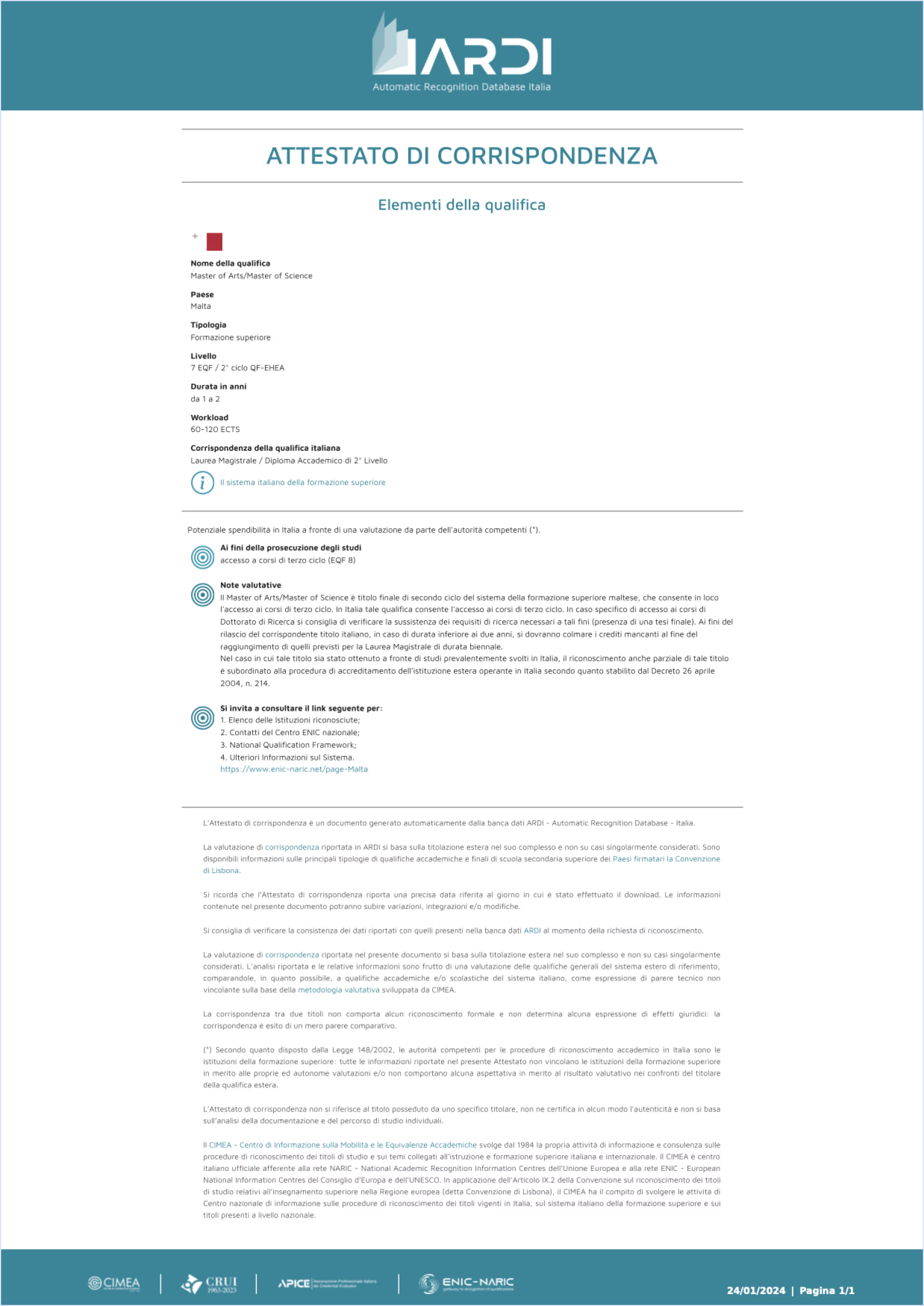


Malta is a signatory of the “Global Convention on the Recognition of Qualifications concerning Higher Education” (”Lisbon Convention”) and is under treaty obligation to recognize degrees issued by Woolf.


Moldova is a signatory of the “Global Convention on the Recognition of Qualifications concerning Higher Education” (”Lisbon Convention”) and is under treaty obligation to recognize degrees issued by Woolf.


Luxembourg is a signatory of the “Global Convention on the Recognition of Qualifications concerning Higher Education” (”Lisbon Convention”) and is under treaty obligation to recognize degrees issued by Woolf.


Kazakhstan is a signatory of the “Global Convention on the Recognition of Qualifications concerning Higher Education” (”Lisbon Convention”) and is under treaty obligation to recognize degrees issued by Woolf.


Liechtenstein is a signatory of the “Global Convention on the Recognition of Qualifications concerning Higher Education” (”Lisbon Convention”) and is under treaty obligation to recognize degrees issued by Woolf.


Kyrgyzstan is a signatory of the “Global Convention on the Recognition of Qualifications concerning Higher Education” (”Lisbon Convention”) and is under treaty obligation to recognize degrees issued by Woolf.


Latvia is a signatory of the “Global Convention on the Recognition of Qualifications concerning Higher Education” (”Lisbon Convention”) and is under treaty obligation to recognize degrees issued by Woolf.


israel is a signatory of the “Global Convention on the Recognition of Qualifications concerning Higher Education” (”Lisbon Convention”) and is under treaty obligation to recognize degrees issued by Woolf.


Ireland is a signatory of the “Global Convention on the Recognition of Qualifications concerning Higher Education” (”Lisbon Convention”) and is under treaty obligation to recognize degrees issued by Woolf. Also, Woolf degrees are recognized in Ireland on an equivalency basis through an “Education Credential Assessment”.
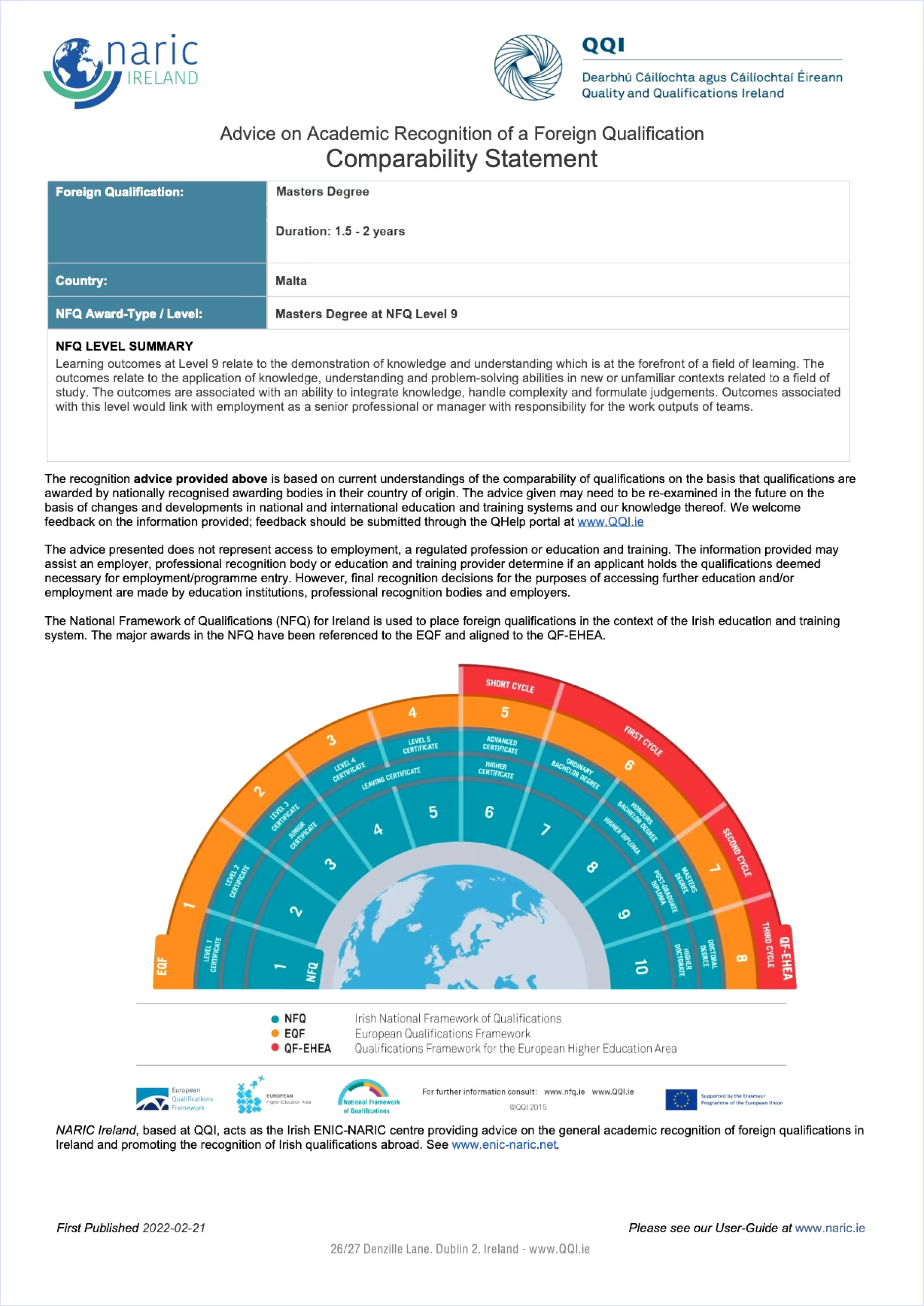


Iceland is a signatory of the “Global Convention on the Recognition of Qualifications concerning Higher Education” (”Lisbon Convention”) and is under treaty obligation to recognize degrees issued by Woolf.


Hungary is a signatory of the “Global Convention on the Recognition of Qualifications concerning Higher Education” (”Lisbon Convention”) and is under treaty obligation to recognize degrees issued by Woolf.


Holy See is a signatory of the “Global Convention on the Recognition of Qualifications concerning Higher Education” (”Lisbon Convention”) and is under treaty obligation to recognize degrees issued by Woolf.


Greece is a signatory of the “Global Convention on the Recognition of Qualifications concerning Higher Education” (”Lisbon Convention”) and is under treaty obligation to recognize degrees issued by Woolf.


France is a signatory of the “Global Convention on the Recognition of Qualifications concerning Higher Education” (”Lisbon Convention”) and is under treaty obligation to recognize degrees issued by Woolf. Also, Woolf degrees are recognized in France on an equivalency basis through an “Education Credential Assessment”.
The ECA from France shows Woolf's MBA is equivalent to a Level 7 degree within the National Framework for Professional Qualifications. Level 7 corresponds to diplomas awarded five years after the baccalauréat (master, engineering diploma, Grande Ecole diploma, etc.).
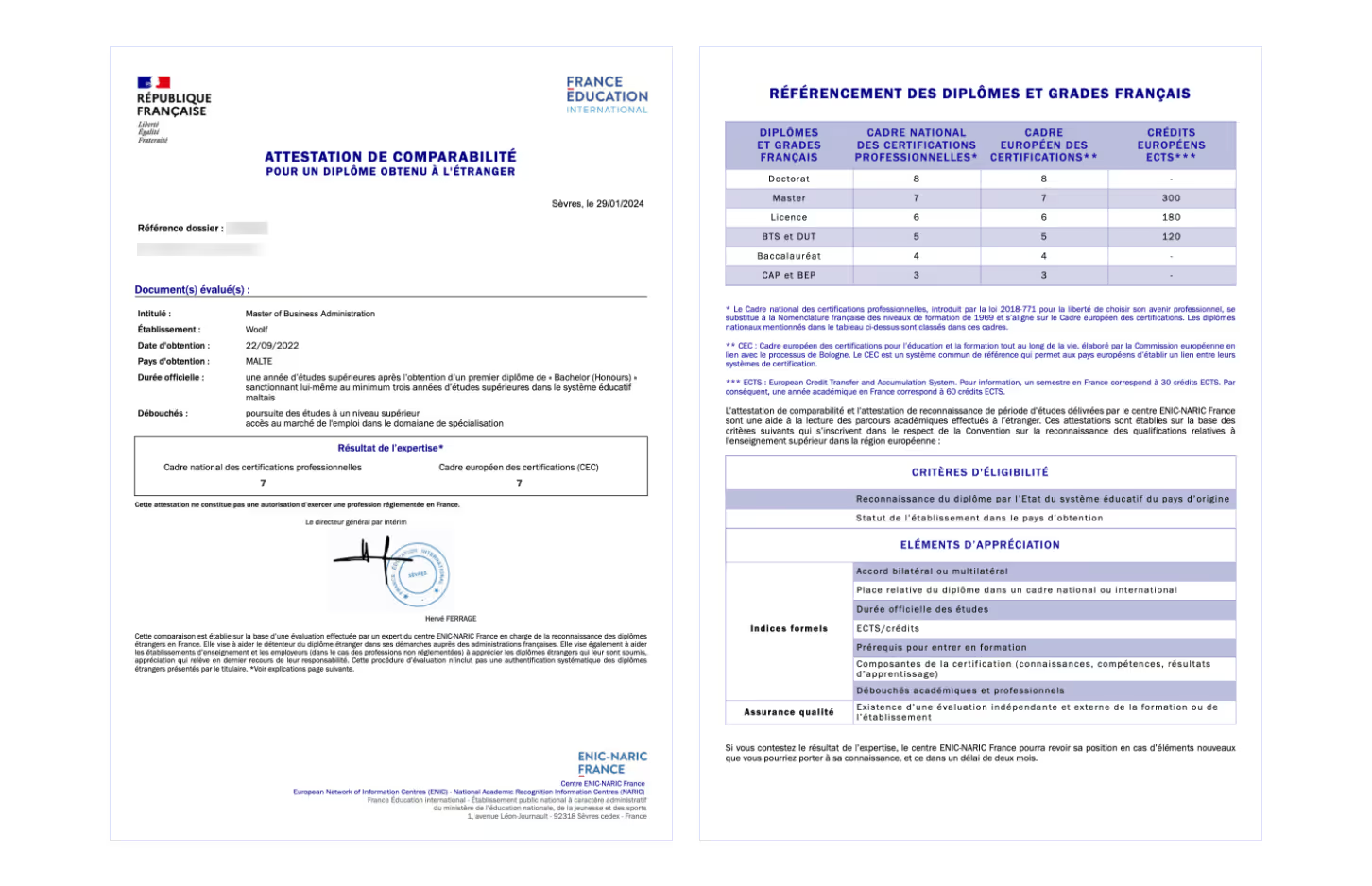


Finland is a signatory of the “Global Convention on the Recognition of Qualifications concerning Higher Education” (”Lisbon Convention”) and is under treaty obligation to recognize degrees issued by Woolf. Also, Woolf degrees are recognized in Finland on an equivalency basis through an “Education Credential Assessment”.
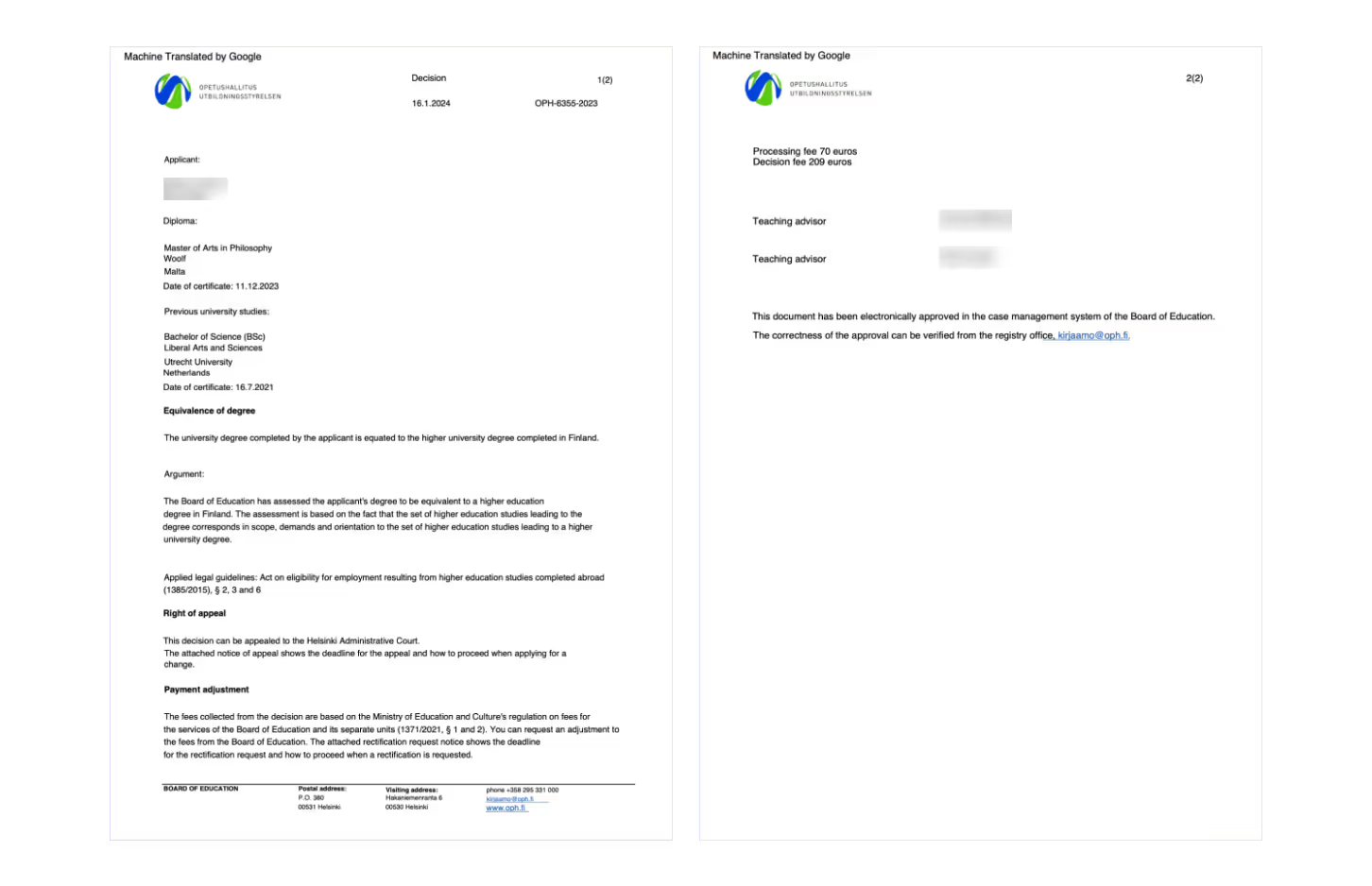


Germany is a signatory of the “Global Convention on the Recognition of Qualifications concerning Higher Education” (”Lisbon Convention”) and is under treaty obligation to recognize degrees issued by Woolf.


Georgia is a signatory of the “Global Convention on the Recognition of Qualifications concerning Higher Education” (”Lisbon Convention”) and is under treaty obligation to recognize degrees issued by Woolf.


Estonia is a signatory of the “Global Convention on the Recognition of Qualifications concerning Higher Education” (”Lisbon Convention”) and is under treaty obligation to recognize degrees issued by Woolf.


Canada is a signatory of the “Global Convention on the Recognition of Qualifications concerning Higher Education” (”Lisbon Convention”) and is under treaty obligation to recognize degrees issued by Woolf. Also, Woolf degrees are recognized in Canada on an equivalency basis through an “Education Credential Assessment”.
Woolf (MT) has been evaluated by non-profit, independent evaluators for purposes of academic equivalence and for Canadian immigration and citizenship. Comparative Education Services is part of the University of Toronto and is an authorized evaluation service for the Canadian government. CES reached the conclusion that a Woolf degree to be “from a recognized university” and CES accepted a Woolf master’s degree for purposes of immigration and citizenship.
.avif)
- International Qualifications Assessment Service (IQAS) is one of five organizations designated by the Canadian government to perform Education Credential Assessments (ECAs) for immigration purposes.
- IQAS helps people get recognition for the education and training they received outside of Canada.
- IQAS issues certificates that compare educational credentials from other countries to educational standards in Canada.
- IQAS has concluded that “[Woolf’s] Master of Business Administration degree generally compares to the completion of a Master of Business Administration degree” within Canada.
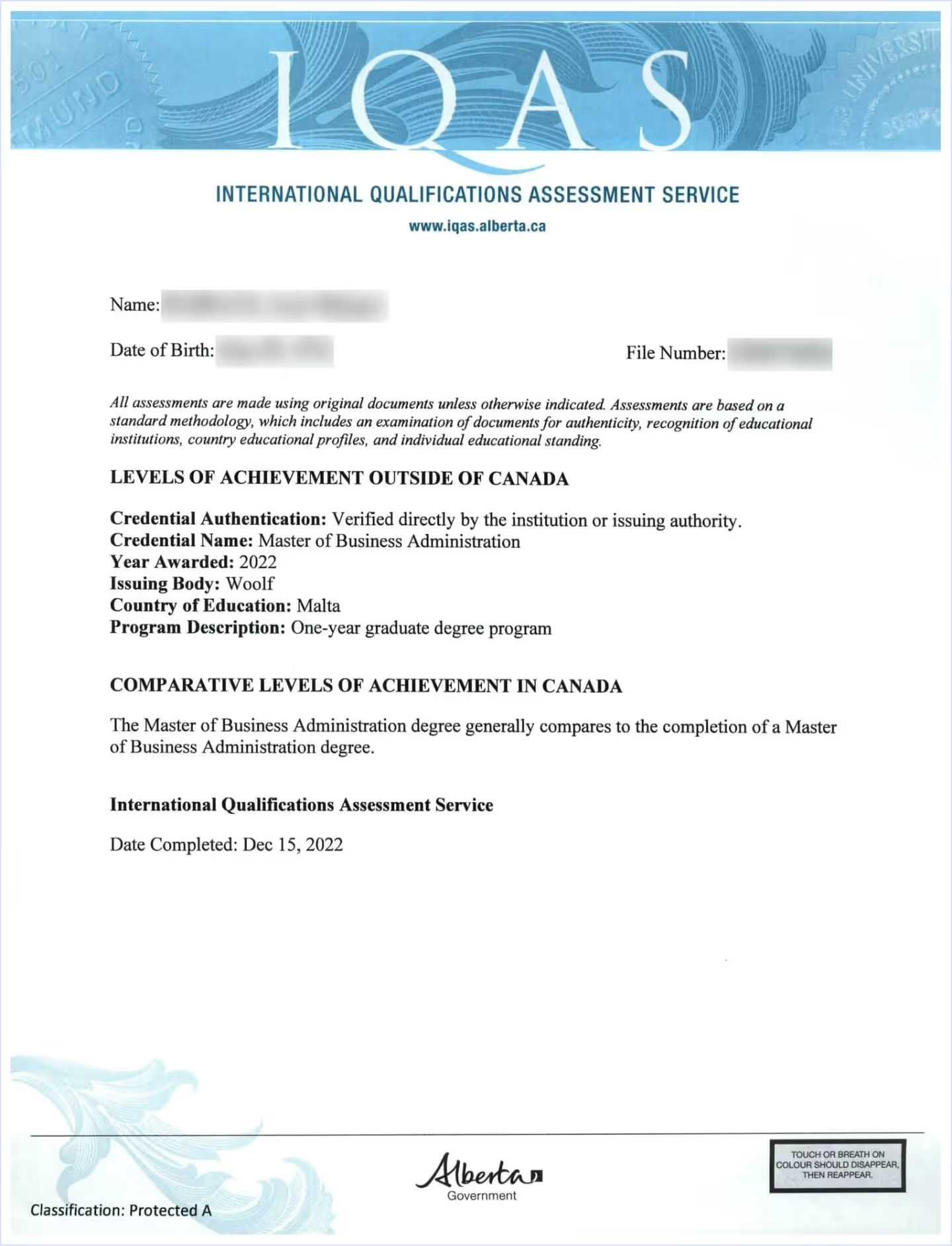


Cyprus is a signatory of the “Global Convention on the Recognition of Qualifications concerning Higher Education” (”Lisbon Convention”) and is under treaty obligation to recognize degrees issued by Woolf.


Czech Republic is a signatory of the “Global Convention on the Recognition of Qualifications concerning Higher Education” (”Lisbon Convention”) and is under treaty obligation to recognize degrees issued by Woolf.


Denmark is a signatory of the “Global Convention on the Recognition of Qualifications concerning Higher Education” (”Lisbon Convention”) and is under treaty obligation to recognize degrees issued by Woolf.


Croatia is a signatory of the “Global Convention on the Recognition of Qualifications concerning Higher Education” (”Lisbon Convention”) and is under treaty obligation to recognize degrees issued by Woolf.


Bulgaria is a signatory of the “Global Convention on the Recognition of Qualifications concerning Higher Education” (”Lisbon Convention”) and is under treaty obligation to recognize degrees issued by Woolf.


Belgium is a signatory of the “Global Convention on the Recognition of Qualifications concerning Higher Education” (”Lisbon Convention”) and is under treaty obligation to recognize degrees issued by Woolf.


Bosnia and Herzegovina is a signatory of the “Global Convention on the Recognition of Qualifications concerning Higher Education” (”Lisbon Convention”) and is under treaty obligation to recognize degrees issued by Woolf.


Belarus is a signatory of the “Global Convention on the Recognition of Qualifications concerning Higher Education” (”Lisbon Convention”) and is under treaty obligation to recognize degrees issued by Woolf.


Australia is a signatory of the “Global Convention on the Recognition of Qualifications concerning Higher Education” (”Lisbon Convention”) and is under treaty obligation to recognize degrees issued by Woolf. Also, Woolf degrees are recognized in Australia on an equivalency basis through an “Education Credential Assessment”.
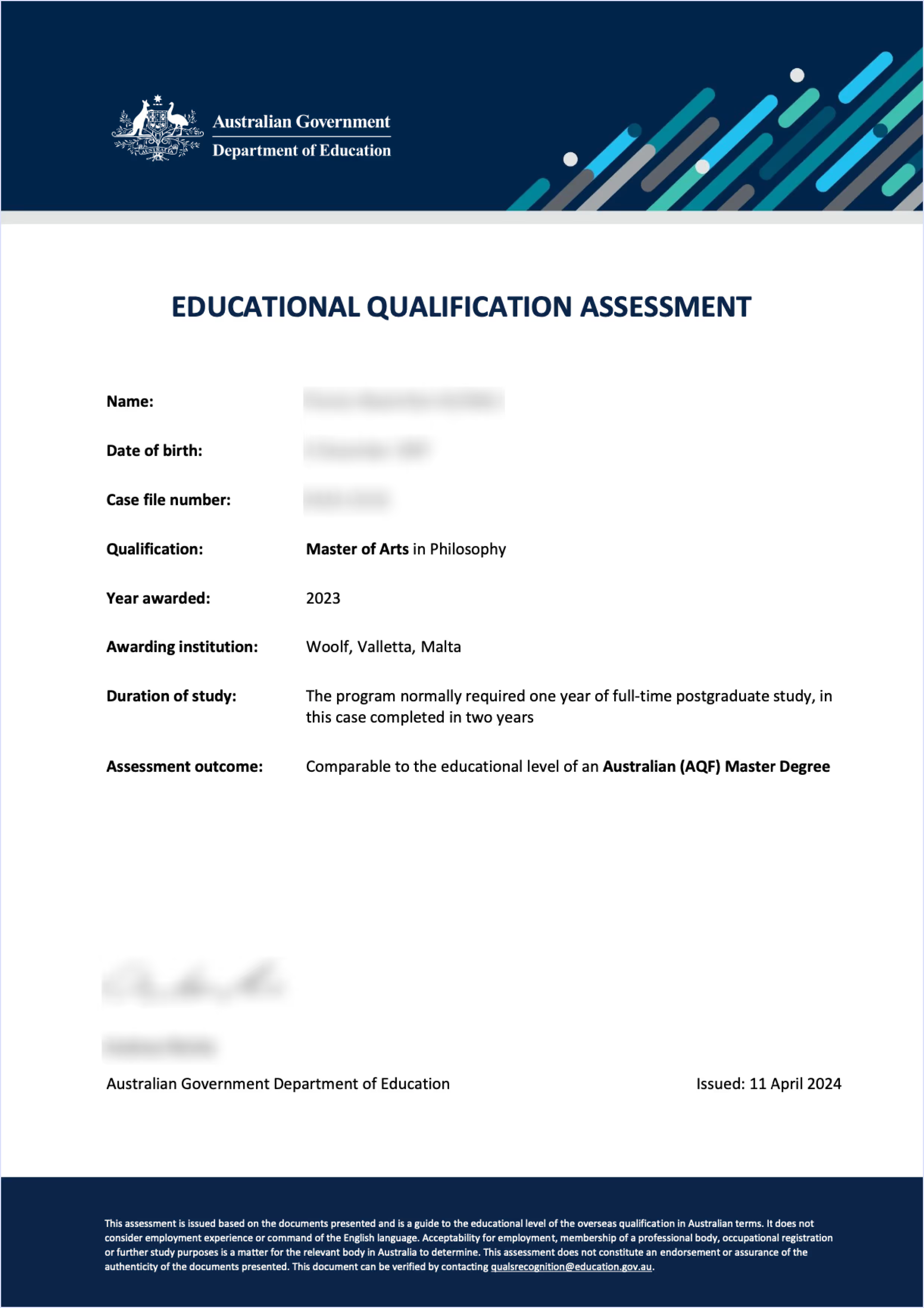


Andorra is a signatory of the “Global Convention on the Recognition of Qualifications concerning Higher Education” (”Lisbon Convention”) and is under treaty obligation to recognize degrees issued by Woolf.


Albania is a signatory of the “Global Convention on the Recognition of Qualifications concerning Higher Education” (”Lisbon Convention”) and is under treaty obligation to recognize degrees issued by Woolf.


Armenia is a signatory of the “Global Convention on the Recognition of Qualifications concerning Higher Education” (”Lisbon Convention”) and is under treaty obligation to recognize degrees issued by Woolf.


Azerbaijan is a signatory of the “Global Convention on the Recognition of Qualifications concerning Higher Education” (”Lisbon Convention”) and is under treaty obligation to recognize degrees issued by Woolf.


Austria is a signatory of the “Global Convention on the Recognition of Qualifications concerning Higher Education” (”Lisbon Convention”) and is under treaty obligation to recognize degrees issued by Woolf.
Frequently Asked Questions
Yes. Woolf is a fully accredited Higher Education Institution in Europe. Degrees and academic credits earned at Woolf are recognized under the Lisbon Recognition Convention and the European Qualifications Framework, ensuring global recognition and portability.
Yes. Woolf graduates have successfully used their degrees for immigration and citizenship applications in multiple countries. For example:
- United States: Woolf degrees are recognized as equivalent to U.S. regional accreditation and count for H-1B cap exemption.
- Canada: Woolf is considered a “recognized university” for immigration and citizenship; ECAs confirm equivalency.
- United Arab Emirates: Woolf is recognized by both the Ministry of Foreign Affairs and the Ministry of Education.
An ECA is the process by which a neutral body evaluates whether a degree from one country is equivalent to a degree in another. There are two types:
- Academic ECA (for study or employment)
- Immigration ECA (for residency, visa, or citizenship purposes)
An ECA evaluates the academic level of a foreign credential against a target country’s benchmarks. For example, ECE.org (a NACES member) has evaluated Woolf master’s degrees as equivalent to those from U.S. regionally accredited universities.
Yes. ECE.org concluded that Woolf’s institutional accreditation is equivalent to U.S. regional accreditation, and that a Woolf graduate degree confers the U.S. equivalent of a master’s. Academic ECAs typically take 5–10 weeks.
Immigration ECAs are often required by governments (e.g., Canada, Australia). These evaluations may take longer, about10–30 weeks, and sometimes review additional schooling.
Yes. Comparative Education Services (University of Toronto), an authorized provider for the Canadian government, has evaluated Woolf degrees as from a “recognized university” and accepted them for immigration and citizenship purposes.
Woolf degrees are recognized across all countries that are signatories of the Lisbon Recognition Convention. Graduates have successfully obtained recognition in the United States, Canada, United Kingdom, United Arab Emirates, Australia, France, Italy, Sweden, Finland, Norway, and the Netherlands, among others.
In many countries, yes. Woolf issues fully accredited European degrees, which are commonly recognized in immigration points systems.
No. In Europe, online and offline degrees hold the same accreditation status.
Generally, yes. Most PhD programs require a master’s, and Woolf issues fully accredited degrees. Final admissions depend on each university’s own criteria, faculty, and subject alignment.
Woolf is accredited in Europe, and most countries recognize European accreditation. Independent evaluators (ECE, CES, etc.) have confirmed equivalency in the U.S., Canada, and other jurisdictions. Always confirm with local authorities for your target country.
ECTS (European Credit Transfer and Accumulation System) is the standard credit system across the European Higher Education Area (49countries). Its wide adoption enables credit transfer and comparability worldwide.
Yes. Woolf’s programs are filed with European partners under the European Standards and Guidelines (2015) and listed on the MFHEA official register.
In Europe, Woolf is a licensed Higher Education Institution, issuing bachelor’s, master’s, and doctoral degrees with the same accreditation status as those from universities. In the U.S., Woolf University is incorporated and approved in Wisconsin under Wis. Stats. § 440.52 (10)(a).
Woolf provides European-accredited degrees used by graduates in India for employment, further study, and immigration. Context around AIU and UGC may apply. Detailed guidance is available in our Help Center.
Yes. Immigration policies and recognition processes vary and may change over time. Woolf provides documentation and guidance, but final recognition is determined by the relevant government or credential authority.